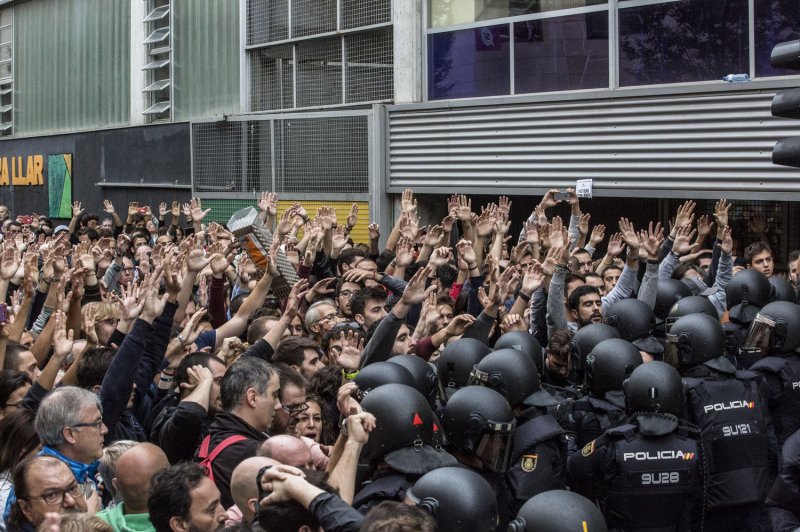Spanish police clash with voters on Oct. 1 in Barcelona, the day of an independence referendum in Catalonia. Wednesday Spanish Prime Minister Mariano Rajoy asked for clarification on whether leaders actually declared independence. Photo by Angel Garcia/ UPI |
License Photo
Oct. 11 (UPI) -- Spanish Prime Minister Mariano Rajoy convened an emergency cabinet meeting on Wednesday -- the first step toward a possible a "nuclear option" to suspend Catalonia's potential independence.
Rajoy called the meeting to discuss Article 155 of the Spanish Constitution, which would allow the leader to suspend Catalonia's autonomy and order new elections.
First, though, Rajoy said it needs to be determined whether Catalonia's leader, Carles Puigdemont, declared independence on Tuesday.
Spain's actions will depend on Puigdemont's explanation of whether or not Catalonia regards itself as a breakaway republic.
"This requirement is necessary when activating Article 155 of the constitution. With it we want to offer certainty to citizens," Rajoy said. "If Puigdemont respects the law, it will end a period of illegality and uncertainty. That's what everyone is waiting for in order to end the situation Catalonia is experiencing."
The region, in eastern Spain, has some governmental autonomy due to its unique culture and history. A decades-long push for independence resulted in a referendum on Oct. 1, when the overwhelming majority of the 2.3 million voters favored independence. Police, directed from the federal capital of Madrid, occupied some polling stations to prevent voting -- leading to some violence in Catalonian cities, like Barcelona.
Pro-independence leaders promised a breakaway state within 48 hours of the referendum.
Tuesday, Puigdemont symbolically declared independence -- but did not expressly pledge it.
"I assume the mandate for Catalonia to become an independent state in the form of a republic," he said, also calling for "a reasonable dialogue, a mediation with the Spanish state."
Over the weekend, Rajoy threatened to suspend Catalonia's semi-autonomy and impose direct rule from Madrid.
Prior to Puigdemont's address Tuesday, the Catalan leader received numerous pleas from European leaders to continue negotiations with the Spanish government on the issue.
"A man who knows what it feels like to be hit with a police baton, today I ask you to respect, in your intentions, the constitutional order and not to announce a decision that would make such a dialogue impossible," Daniel Tusk, a Polish diplomat and president of the European Commission, said.
Tusk added that he asked Rajoy to look for a solution to the problem without the use of force.
"Because the force of arguments is always better than the argument of force."















